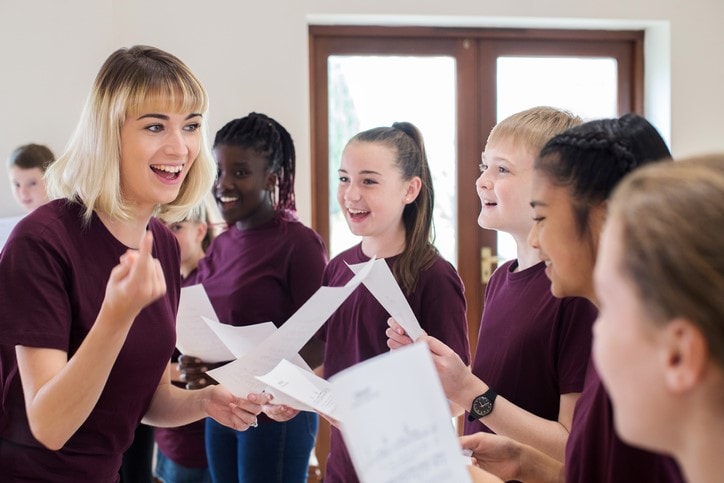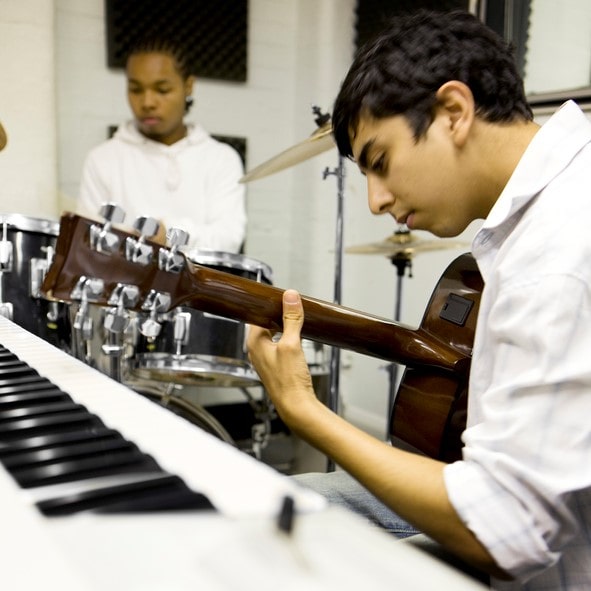/ News Posts / The Concert Is Over
The Concert Is Over
Now What?!
By NAfME Member Lori Schwartz Reichl
This article was originally published in the May 2018 teacher edition of In Tune Magazine.
“Follow effective action with quiet reflection. From the quiet reflection will come even more effective action.” ~ Peter Drucker
The end of the school year is upon us, and final spring concerts are memorably taking place in each of our schools. For music educators, it can feel like a massive weight has been lifted from our shoulders when concert season is complete. Inventory should occur following the successful completion of all adjudications, assessments, performances, and trips. Instruments, music, and other equipment will be returned and inspected. The music library will be organized, and a wish list of needed or replaced musical equipment will be compiled. But, completely closing down the classroom or rehearsal space before the students’ last day of school can send the wrong message to students, parents, colleagues, and administrators. We want our music course to be treated like any other academic subject, so we must show this in our planning and purposes.
When is your final concert? For some music directors, it is as early as April! For others, mid-May or even early June signifies the final bow. Often, concert dates are not a preferred choice; rather they are scheduled according to the availability of a performance venue shared among many schools. Even a rigorous testing schedule may be the cause of a selected performance date. Regardless, creating opportunities for performance as close to the final day of school may keep the momentum going for both the students and director. Realizing that performances are not the sole accumulation of a music program, they do, however, provide motivation.
“If your spring concert/final performance is completed weeks before the end of the school year, consider other opportunities for students to perform during the last few weeks of school.”
If your spring concert/final performance is completed weeks before the end of the school year, consider other opportunities for students to perform during the last few weeks of school. Schedule an adjudication that culminates in a visit to an amusement park. Students perform during the earlier part of the day at a nearby high school, collegiate institution, or performance venue. I’ve recently heard of some directors forgoing registration with a particular festival and instead inviting a clinician to their school in the morning and independently scheduling admittance to an amusement park as a reward. Consider utilizing musical selections from your spring concert and adding a new selection for this performance. It’s an excellent way to keep the passion going beyond the spring concert and the learning of new literature.
If you haven’t offered a formal recruitment presentation to the students at your feeder schools, contact those directors and ask to schedule one. Along with an enticing presentation of your program and distribution of information, invite energetic students to perform. Consider bringing the large band, chorus, orchestra, a miscellaneous ensemble, such as the jazz band or specialty choir, or even individual musicians to showcase components of the program. The performing students will look forward to returning to their former schools to demonstrate their talents while exciting the younger musicians to continue with participation in the music program.
Is there a graduation or promotion ceremony for the class about to depart the school, such as the 5th, 8th, or 12th grade students? If so, consider having your ensemble perform for this event. This is an excellent way for non-music parents to see and hear school musicians perform, thereby getting a glimpse into the music program. It may also spark interest in the younger siblings to participate in the program.
Many celebrations occur at the end of the school year, such as an academic awards breakfast, a volunteer acknowledgement luncheon, a sports banquet, orientation for incoming students, a May festival, and so forth. Ask to perform at any of these events! Perhaps your students can perform “The Star-Spangled Banner,” your school song, a prelude or processional tune, a featured selection, or a combination of these types of selections. Your performing ensemble could even provide background music at a dining event. Often performances of this nature require less stress than a true concert, are eagerly anticipated by the performers and audience, and serve as a memorable community experience.
If such opportunistic performances are not an option after your spring concert has concluded, then what do you have planned for your students for the remaining class periods or rehearsals? Whatever it is, make it engaging! Do not have students watch a video unless its contents have teaching power. Record the final concert and have students adjudicate it. Ask students to reflect upon their musical growth throughout the school year. Consider spending a unit reviewing musical concepts such as vocabulary or rhythms. Have students research a composer. Consider a composition unit. Encourage students to explore future musical selections they may wish to learn or perform. Collaborate on chamber music. Create an opportunity for solo performances in class, at home, in the school building, or throughout the community. Have students write about their musical background: Who inspired them to gain a music education, or what do they hope to achieve by remaining in music? Write thank you notes to every staff member or community member who attended a performance throughout the school year.
“Keep the motivation going beyond the concert! Just because the music has ended, doesn’t mean learning should.”
Do you need more ideas? Ask a colleague what activities he/she has planned to inspire student engagement through the final days of school. Kindly ask if you can review the activity or implement a portion of it. Show gratitude, credit when necessary, and uniquely apply such proven quality ideas to fit your personality, your program, or the needs of your students.
Finally, as the end of the school year quickly approaches, carve out some quality time to reflect on you, your students’, and your program’s achievements and challenges. What excited you and your students? What stressed you or them? When was motivation at its highest? When was inspiration at its lowest? Which lessons, performances, fundraisers, field trips, or other musical opportunities would you or your students like to eliminate or add? Which events would you or your students prefer moving to an earlier or later date? Who offered the greatest support to you and/or your students? Who or what inspires you to continue in your current position?
Keep the motivation going beyond the concert! Just because the music has ended, doesn’t mean learning should.
About the author:

Photo: Richard Twigg Photography
NAfME member Lori Schwartz Reichl is a music educator and author. Visit her at makingkeychanges.com.
Lori Schwartz Reichl actively serves as an adjudicator, clinician, conductor, private instructor, speaker, and writer. Lori is the author of the series “Key Changes: Refreshing Your Music Program” published monthly for In Tune Magazine’s teacher edition where she provides resources to enhance the music classroom and rehearsal space. She also serves as a journalist for Teaching Music Magazine. Lori has worked in rural, suburban, and urban public schools and is recognized for her work with Title I schools. As an avid presenter at conferences, professional development sessions, and universities nationwide, she serves as a resource for building community, developing effective classroom management techniques and rehearsal routines, and motivating diverse learners.
Join Lori for a week-long graduate course reflecting on the ideas shared each month in this column: AMUS 605: Making Key Changes: Refresh Your Music Program, 3 credits, July 22 – 26, 2019 @ Villanova University.
Did this blog spur new ideas for your music program? Share them on Amplify! Interested in reprinting this article? Please review the reprint guidelines.
The National Association for Music Education (NAfME) provides a number of forums for the sharing of information and opinion, including blogs and postings on our website, articles and columns in our magazines and journals, and postings to our Amplify member portal. Unless specifically noted, the views expressed in these media do not necessarily represent the policy or views of the Association, its officers, or its employees.
Catherina Hurlburt, Marketing Communications Manager. May 14, 2019. © National Association for Music Education (NAfME.org)
Published Date
May 14, 2019
Category
- Ensembles
- Lifelong Learning
Copyright
May 14, 2019. © National Association for Music Education (NAfME.org)







